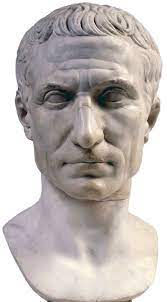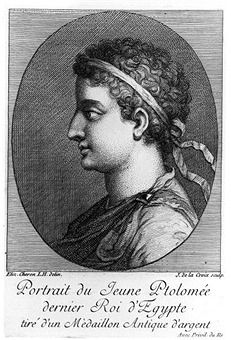“Shame on the House of the Ptolemies”: The Fate of the Assassins of Pompey
- ptcrawford
- Aug 24, 2025
- 7 min read

Having been defeated by Caesar at the Battle of Pharsalus on 9 August 48BC, Pompey fled across the Aegean to Mytilene and then on to Cilicia, where he held a war council with his remaining advisors and decided to head to Egypt, which had provided him with aid the previous year. Hearing that Ptolemy XIII is campaigning around Pelusium against his sister, Cleopatra VII, Pompey sent word to Ptolemy of his approach.
It could be that this sending ahead to the pharaoh that sealed Pompey’s fate…

Knowing that this great general would be followed by another, a meeting of Ptolemy’s council debated on what to do: should they drive Pompey away or welcome him? It was argued that neither was a safe option – the former would make Pompey an enemy of Egypt (while annoying Caesar for forcing him to continue his pursuit), while the latter could make Pompey the master of Egypt and Caesar its enemy… Killing Pompey would keep Egypt free and meet with the relief and even satisfaction of Caesar (In Caesar, BC III.104 claims to have thought that the pharaoh would kill Pompey due to the presence of Pompeian forces in Egypt already; of course, this is with the benefit of hindsight rather than foresight).
On 28 September 48BC, a day before his 58th birthday, Pompey’s ship was anchored off the Egyptian coast. It was met by a small fishing boat carrying a small deputation made up of Achillas, the pharaoh’s leading general, Lucius Septimius, a former Pompeian officer now in Egyptian employ, and a centurion called Salvius.
This low-key reception raised some suspicion in Pompey’s advisers, who counselled him to put back out to sea. Pompey’s wife, Cornelia Metella, also urged him to withdraw as she felt his life was in danger.
However, reassured by the presence of Septimius, and perhaps some of the guarantees of Achillas, Pompey agreed to board the fishing boat with a small entourage for transport to shore. Pompey should have listened to his advisers…
As the boat reached the shore, with a large royal entourage waiting, Pompey when to rise from his seat, only for Septimius to thrust his sword into his back. Achillas and Salvius then stabbed him with their daggers.
Pompey’s head was removed, his body dumped into the sea, from where it was recovered by one of his freedmen and burned on a funeral pyre.

Ptolemy and his counsellors had thought to make a gift of Pompey’s severed head and his signet ring to Julius Caesar, expecting him to be thankful. Instead, Caesar was appalled at the treatment of such a venerable Roman, turning away from the sight, and crying when presented with Pompey’s signet ring. He saw to it that Pompey’s remains were taken to Cornelia, who had them buried in his Alban villa.
But what then became of those involved in the assassination of Pompey? These assassins can be broken down into two groups: perpetrators and instigators. We have already met the men who carried out the deed – Lucius Septimius, Salvius and Achillas, but several others are mentioned as having planned it.

Lucius Septimius had served under Pompey during his eastern campaigns of the 60s BC and had been part of the army of Aulus Gabinius that had restored Ptolemy XII to the throne in 55BC. While Caesar records him as a ‘military tribune’, it seems that he was by 48BC outside the Roman army system, serving as part of a mercenary garrison called the Gabiniani in Egypt.
As a leading figure of this Roman bodyguard for the pharaoh and an acquaintance of the target, Septimius was in prime position to be charged with the assassination of Pompey. Despite his spearheading the actual assassination, the fate of Septimius goes unrecorded. Modern fictional works have him either forgiven as part of Caesar’s programme of clementia or executed for the heinous act of treachery he had undertaken.

The other Roman recorded as taking part in the assassination of Pompey – the centurion Salvius – is the most obscure personage connected with the deed. He was almost certainly, like Septimius, one of the 2,500 infantry and cavalry sent to Egypt by Aulus Gabinius to restore Ptolemy XII to the Egyptian throne in 55BC and then stationed there to protect the pharaoh. Upon the death of Ptolemy XII, they sided with his son Ptolemy XIII against his daughter, Cleopatra. It is probably in connection with this action that Caesar claimed that the men of the Gabiniani, despite being Roman soldiers, had become very much accustomed to Alexandrian customs, taking Egyptian wives and having children. Salvius and Septimius may therefore have seen themselves as acting in the best interests of their master – the Egyptian pharaoh, rather than traitors to a Roman general. As with Septimius, Salvius’ fate goes unrecorded, but it could be that he did not survive the subsequent war between the Gabiniani-backed Ptolemy XIII and the Caesar-backed Cleopatra VII. And if they did, they surely faced some kind of reckoning – execution, self-imposed exile or even clementia – upon Caesar’s victory when the Gabiniani were replaced with three loyal Roman legions.
The last of the three perpetrators of the assassination, Achillas, also played a prominent role in the fighting that followed between the forces of Ptolemy and Cleopatra. He was placed in command of Ptolemy’s army by the regent Pothinus and marched on Caesar’s position in Alexandria with 20,000 infantry and 2,000 cavalry.
During the subsequent siege, Ptolemy’s younger sister Arsinoe escaped from Caesar’s clutches and joined Achillas. However, she soon fell out with the general and had her tutor Ganymedes execute Achillas. It could well be that the three assassins of Pompey were killed during the fighting against Caesar that their action precipitated.
But what then about those in the pharaohic council who had planned the assassination? Achillas was one of them, but blame for coming up with the plot is usually given to either Ptolemy’s eunuch regent, Pothinus, or his tutor, Theodotus of Chios.

Pothinus is usually portrayed as being at the centre of many of the political machinations in Egypt since the death of Ptolemy XII in 51BC. He is considered the instigator of the falling out between Ptolemy XIII and Cleopatra VII to have his ward rule as sole monarch. It would be expected then that he would take a prominent role in the Ptolemaic response to the participants of the Roman civil war arriving on his Egyptian doorstep.
However, none of his subsequent moves worked out as he has planned. He must have been taken aback by Caesar’s outraged response to his presenting of Pompey’s head revealing how seriously he had miscalculated Caesar’s objectives.
Caesarian outrage and Cleopatra’s ability to take advantage of that robbed Pothinus of any advantage. What turned out to be his last desperate gamble was to urge Achillas to attack Caesar’s forces in Alexandria. This would lead to the Siege of Alexandria of late 48BC to early 47BC; however, Pothinus’ messengers to the Egyptian general were discovered and Caesar had the eunuch regent imprisoned and executed.
Theodotus of Chios was a trained rhetorician, tutor and guardian of Ptolemy XIII. His role in planning the assassination of Pompey is disputed in the sources. The likes of Caesar and Lucan ignore him completely, while Plutarch has him as the mastermind of it all, being the one to suggest that neither driving Pompey away nor welcoming him was a safe option, leaving assassination.
Also demonstrating the lack of unanimity in the sources, Livy and Plutarch have Theodotus, rather than Pothinus, be the one to present Caesar with Pompey’s head and signet ring.
If this was the case, it makes Theodotus’ ability to then escape Caesarian outrage more surprising. Pothinus and Achillas might have been killed during the machinations that the assassination of Pompey helped initiate, but Theodotus successfully fled Egypt altogether and evaded Roman authorities for up to five years. We might suggest that he was able to do so by having absconded with some Egyptian royal wealth, but Plutarch would have it that Theodotus was forced to eke out a meagre existence across the eastern provinces. This was until 43/42BC when he fell into the hands of the Liberators (Plutarch, Pompey 80.9 says Brutus; Appian, BC II.90 says Cassius) and was executed for his past crimes. The rhetorician Quintilian records that ‘a discussion with Caesar about the punishment of Theodotus’ was a subject in first century AD schools.

Of course, technically, the assassination of Pompey took place under the auspices of the pharaoh Ptolemy XII, but then there was a reason when he had a regent in Pothinus – in 48BC, Ptolemy was at most 14 years old.
By the time Pompey was sailing towards Egypt, Ptolemy and Pothinus had already overturned the succession plan of the previous pharaoh, Ptolemy XII, by removing Cleopatra VII from power, initiating the civil war that Pompey and particularly Caesar were about to be drawn into.
Famously, Cleopatra proved more able to attract the favour of Caesar – the murder of Pompey by Ptolemy’s faction cannot have helped their chances – and once Roman reinforcements arrived, Caesar and Cleopatra won a decisive victory at the Battle of the Nile in 47BC.

Ptolemy XIII fled from the battlefield and reputedly drowned while attempting to cross the Nile, although there is some discrepancy about whether he was crossing in flight or recrossing to undertake negotiations with the victors. One might say that it was a suitably ignominious end for a pharaoh who oversaw Pompey’s assassination, but then Ptolemy XIII was still a teenager, with limited say in the workings of ‘his’ government.
It would seem then that there is a good chance that five of the six perpetrators and instigators of Pompey’s assassination did not survive the deed by more than 6 months, and justice would catch up to the last surviving plotter – Theodotus – by 42BC, with ironic addendum of that justice being meted out by one of the principal assassins of Julius Caesar.
![“What a [Herculean] Manoeuvre!”: Inventing the Bear Hug](https://static.wixstatic.com/media/a3d50b_8b9ad5c763e042409eb39fc07801a1a2~mv2.jpg/v1/fill/w_800,h_1339,al_c,q_85,enc_avif,quality_auto/a3d50b_8b9ad5c763e042409eb39fc07801a1a2~mv2.jpg)


Comments